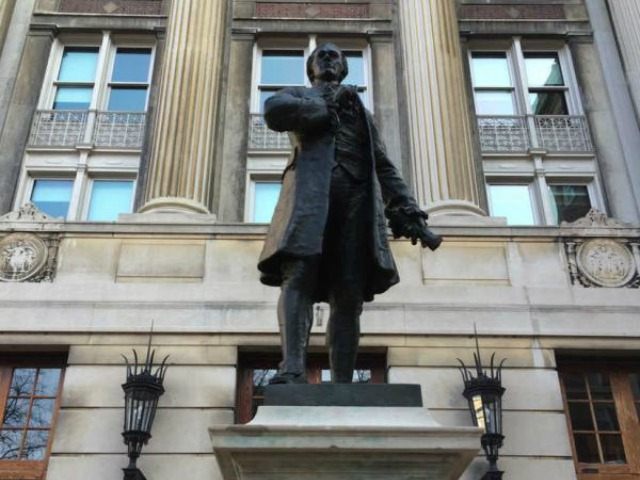Thomas Jefferson and Alexander Hamilton were both active in the Revolutionary effort and in the founding of the United States. Later they served the republic under President George Washington, with Jefferson becoming the first Secretary of State and Hamilton the first Secretary of the Treasury.
But from the republic’s inception, the two harbored opposing visions of the how the young country should mature. A significant disagreement centered around the manner in which they viewed and applied the role of government.
Hamilton distrusted the people, believing that popular will was flawed and that the federal government should therefore wield considerable power. Jefferson, however, had a skeptical view of centralized authority and placed his trust in the people to self-govern their own affairs. One feared anarchy and obsessed over components of order; the other feared tyranny and fought for a continuing expansion of liberty.
Both, of course, were patriots and necessary to the American experiment. Their philosophical disagreements resulted in the very first political parties of the Western world.
Particularly as to the role of government in a free society, the people have been divided between their contrasting visions. It is an intellectual debate that continues today.
American history is replete with accepted rules on how our social compact should function. Generally speaking, the people of our republic have always been independent and self-reliant. Whether realizing manifest destiny or defending our unalienable God given rights, there has always been a touch of nonconformity and rebellious independence in the American spirit.
With painful lessons of revolution from Great Britain recollecting the abuses of monarchy, our founding fathers recognized the hazards of unlimited government. So they purposely fashioned a Constitution limiting the federal government’s authority to only delegated areas, dispersing public authority among three branches of government and the respective states in the hope that each would resist unconstitutional aggression by the others.
It was their skepticism of government, not its embrace, which made the founders historically unique.
Even Hamilton, a proponent of centralization, recognized the necessity of a constrained federal government.
Despite the founders’ warnings, however, we now stand on the edge of a precipice, embracing and adoring the weight of unconstitutional federal authority in a fashion never envisioned.
Not only do many remain content in ignoring self-rule, we have inched closer to realizing the creation of a nightmare scenario — a bourgeoning reality few have fought to alter — that politically speaking, our nation is racing toward a leviathan bureaucracy. Some are distressed that we may have actually reached a point where a majority of voters will forever guarantee a dependent populace demanding subjugation and care from big government.
Modern political parties are guilty of enlarging government’s scope by demanding that it sustain and shelter us cradle-to-grave, while universally neglecting families, religious organizations, community charities and others that are better able to perform needed services.
Instead of encouraging independence, we have placed protectors in office who have suggested countless feel-good programs, using our desires of security to fuel their ambitious careers.
With power seekers advancing their agendas by promising a little more on this and a little more on that, an unprecedented number of Americans are now dependent on the federal government for their income, education, retirement and other amenities of life. Programs that once were focused only on the impoverished now extend across an economic spectrum, even as the number of people paying taxes continues to decrease.
A national shift away from self-government has wreaked havoc on our national essence, while diluting the noble characteristics of federalism.
Given the above, modern historians have pondered: who has the more enduring vision, Jefferson or Hamilton?
But the question itself is misleading.
On first impression, it would seem that Hamilton’s view of an active government has dominated our modern understanding.
And yet, by accepting this new paradigm of unlimited government as absolute, we have rejected Jefferson’s vision and exceeded Hamilton’s ambition.
Perhaps neither man’s preference has actually endured; and a new era, one hostile to traditional liberty, has dawned.
If so, there is little left for Conservatives to conserve, but much to reform.

COMMENTS
Please let us know if you're having issues with commenting.